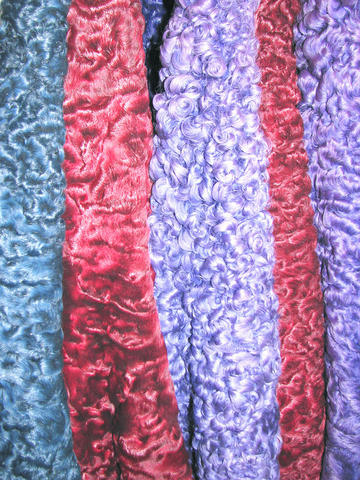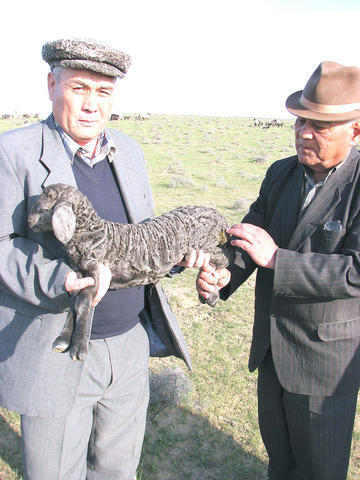A newborn karakul lamb scampers across the grass-fringed desert sand, its fur a wave of tight black curls that form a pattern as unique as human fingerprints.
Within days, the curls will unfold, become rough and wiry and turn the soft, sensuous karakul pelt -- better known as astrakhan or Persian lamb -- into cheap sheepskin.
So to save the pelt the lamb will be slaughtered and skinned before sundown -- along with dozens of others born here at the Kanimekh farm in the desert of central Uzbekistan. Eventually, the harvest of pelts will become chic coats, cuffs and collars worn by runway models and fashion victims across the globe.

PHOTO: AP
After investigators for the US Humane Society visited an Uzbek farm in 2000, they condemned the industry as "cruel, grotesque and inexcusable." But the trade has picked up sharply in recent years.
Pop singer Madonna sported a karakul coat -- until designer Stella McCartney scolded her. Celebrities like Lisa Marie Presley and Ivana Trump reportedly flaunt their karakul despite the criticism.
Activists are particularly galled by the production of karakulcha, or broadtail pelts. Every September, older ewes are artificially inseminated. The mother is slaughtered two weeks before delivery, the fetus is extracted and skinned and its body ground to feed poultry or pigs. The resulting fur resembles watered silk.

PHOTO: AP
"This method is justified, toothless ewes are destined to die of hunger anyway," said Surat Yusupov, director of the Uzbek Karakul Breeding Institute.
Shepherds say the pelts are key to their livelihood. And they point out the carcasses are not discarded: The meat is prized as a low-fat delicacy, the hooves processed for glue, the maw sold to cheese makers or pharmaceutical companies.
"We cope with life in desert and the campaigns of those activists only add to the difficulties we encounter here," said Malibek Abdukadyrov, a manager at the Kanimekh farm.
Afghan President Hamid Karzai, who has become an unlikely international fashion icon, often sports a chic karakul hat and may be partly responsible for the surge in interest in the fur. By 2004, Prada had shown a collection made of swakara, or African karakul and soon designers from Armani to Gucci presented new coats, trims, suits and skirts.
Last year, Uzbekistan sold almost 137,000 karakul pelts abroad, one third more than in 2005, reported Uzbek Karakuli, a state-run exporter. The wholesale price for each pelt climbed to US$18, while a designer coat sewn from about 30 pelts costs thousands of dollars.
The pelts may be headed to the glittering runways of Paris and Milan. But they start their journey in dilapidated facilities built in the Soviet times, when the advent of electricity and natural gas first made construction of this settlement in the Central Asian desert possible.
Karakul wool accounted for two-fifths of the Soviets' fur exports. Felt-thin and velvet-smooth, it came in a rainbow of tints ranging from black to pink to lilac, colors that were dubbed "sundown," "candlelight" or "apricot flower."
Karakul sheep first appeared hundreds of years ago in the Kyzylkum desert, around the Karakul, or Black Lake, near the ancient Uzbek city of Bukhara, said Yusupov of the breeding institute.
Bukhara's emirs maintained a world monopoly on production and export of its golden fleece -- through Persia and the Russian city of Astrakhan -- punishing would-be smugglers with decapitation.
"It was like silk for ancient China," said Kenjabai Madaminov of Uzbek Karakuli, the exporter.
Then in 1907, the last emir of Bukhara allowed the British to ship some karakul to Namibia, where the sheep became the founding herd of swakara, or Southwest African karakul. When the emir fled the Soviets in 1920, he took his best sheep to Afghanistan, now the world's leading producer of karakul.
Yusupov said, however, that Afghanistan doesn't produce the variety of karakul pelts that Uzbekistan does, because of his country's scientific breeding program. His institute, he said, has developed 28 types of karakul, five of them in recent times.
After the institute was established in 1930 in Samarkand, it opened branches and introduced sheep into other southern Soviet regions. Lambskin hats became a distinction of Communist bosses and top military, and karakul pelts sold briskly at Western fur auctions.
Production peaked in the 1970s, when about 10 million Soviet, Afghan and South African pelts were sold worldwide each year. The 1991 Soviet collapse coincided with dwindling demand for fur, and Uzbek karakul farms, now transformed into cooperatives, struggled until the early 2000s. Today, with the boom in karakul sales, Uzbekistan is the world's second largest producer after Afghanistan.
It takes a lot of human sweat and sheep blood to get the pelts to the market.
High-pitch bleating echoes throughout Kanimekh at dawn when the lambs are taken to an old barn that serves as a slaughterhouse, where butchers strip the pelts with a few swift strokes of their knives. It's like removing "a stocking," one of them said.
Men and women sitting on the ground outside the slaughterhouse rub the pelts clean with knives and scrapers. Then, the pelts are pickled in coarse salt and heaped on wooden scaffolds. For a week, fat and other fluids leach out, coloring the salt pink. Finally, the pelts are fermented with barley flour in a rotating vat filled with tepid water.
After another cleaning and grading by size, pattern and tint, the pelts are dispatched to a sewing factory or to one of about 20 state-controlled export companies.
Only male newborn lambs with specific faults and flaws -- up to a third of the flock -- are harvested for their pelts. Those spared will be fleeced twice a year, their wool used for weaving the prized Bukhara carpets, treasured fabrics as old as karakul itself.
Fur industry officials say that critics don't understand that the Kyzylkum desert is far crueler than the annual karakul harvest.
With temperatures ranging from -30oC to 50oC, the Kyzylkum is a desolate place, home to scattered bushes, wormwood and a few wild herbs. The landscape is so barren only the hardiest animals -- camels, goats and karakul sheep -- have a chance of survival.
The karakul sheep is uniquely adapted to this environment. It drinks salty water cattle reject and regulates breathing and blood density to survive the heat or cold.
"Karakul sheep are a wonder of nature," said Adham Gaziev, deputy to the director of the Uzbek Karakul Breeding Institute.
Shutting down the karakul trade would wipe out an industry that many Uzbeks depend on for their survival, Gaziev said.

Auckland rang in 2026 with a downtown fireworks display launched from New Zealand’s tallest structure, Sky Tower, making it the first major city to greet the new year at a celebration dampened by rain, while crowds in Taipei braved the elements to watch Taipei 101’s display. South Pacific countries are the first to bid farewell to 2025. Clocks struck midnight in Auckland, with a population of 1.7 million, 18 hours before the famous ball was to drop in New York’s Times Square. The five-minute display involved 3,500 fireworks launched from the 240m Sky Tower. Smaller community events were canceled across New Zealand’s

The Ministry of Foreign Affairs (MOFA) yesterday said it is closely monitoring developments in Venezuela, and would continue to cooperate with democratic allies and work together for regional and global security, stability, and prosperity. The remarks came after the US on Saturday launched a series of airstrikes in Venezuela and kidnapped Venezuelan President Nicolas Maduro, who was later flown to New York along with his wife. The pair face US charges related to drug trafficking and alleged cooperation with gangs designated as terrorist organizations. Maduro has denied the allegations. The ministry said that it is closely monitoring the political and economic situation

UNRELENTING: China attempted cyberattacks on Taiwan’s critical infrastructure 2.63 million times per day last year, up from 1.23 million in 2023, the NSB said China’s cyberarmy has long engaged in cyberattacks against Taiwan’s critical infrastructure, employing diverse and evolving tactics, the National Security Bureau (NSB) said yesterday, adding that cyberattacks on critical energy infrastructure last year increased 10-fold compared with the previous year. The NSB yesterday released a report titled Analysis on China’s Cyber Threats to Taiwan’s Critical Infrastructure in 2025, outlining the number of cyberattacks, major tactics and hacker groups. Taiwan’s national intelligence community identified a large number of cybersecurity incidents last year, the bureau said in a statement. China’s cyberarmy last year launched an average of 2.63 million intrusion attempts per day targeting Taiwan’s critical

‘SLICING METHOD’: In the event of a blockade, the China Coast Guard would intercept Taiwanese ships while its navy would seek to deter foreign intervention China’s military drills around Taiwan this week signaled potential strategies to cut the nation off from energy supplies and foreign military assistance, a US think tank report said. The Chinese People’s Liberation Army (PLA) conducted what it called “Justice Mission 2025” exercises from Monday to Tuesday in five maritime zones and airspace around Taiwan, calling them a warning to “Taiwanese independence” forces. In a report released on Wednesday, the Institute for the Study of War said the exercises effectively simulated blocking shipping routes to major port cities, including Kaohsiung, Keelung and Hualien. Taiwan would be highly vulnerable under such a blockade, because it